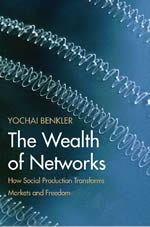Comments on
Chapter 7: Political Freedom Part 2: Emergence of the Networked Public Sphere
While I began reading this with some skepticism, thinking that the introduction of the chapter seemed both idealized and US-specific, the author addresses many of my initial concerns.
The primary consideration with a work like this one is its relativism. The internet is incomprehensibly large and far-reaching. An analytical work is finite. Between the two Benkler has posited a relativist stance, asking us to consider the internet as the best current public sphere we have. This is not in comparison to what the public sphere could become in some utopia but in comparison to mass media’s real constraints.
Benkler cites important progress in authoritarian countries with controlled internet access (para 90), but I wonder if the internet will not become more controlled in the future. Thinking of web usage in the ’90s, there were few laws in place and few regulations, but now lawmakers seem to at least pretend to understand the World Wide Web. Copyright issues are settling. Laws are clearer now that the possibilities of the internet are becoming more familiar and more easily put into context. While the internet is becoming looser in countries like China and Iran, it is become tighter in the US. I do not think this is inherently bad, but I do wonder if it will eventually affect the internet’s ability to serve as a democratic public sphere.
Benkler addresses many of the arguments against seeing the internet as a democratic publich sphere and does so well. But I do think it will change and that there is the potential for us to find ourselves in a situation where an accessible public sphere is only temporarily accessible, until something new comes along. Novelty of the internet kept it from becoming immediately restrained, although some of its complexities probably inhibited its use. It seems to currently be in a heyday. Will that change? Must it? And, if so (to either), must something new continually be made so that we have moments with venues filled with diverse voices, venues that blossom, become chaotic, streamline (as seemed inevitable – see para 53 for natural network concentrations), and become regulated, and then become obsolete?


 Yale University Press
Yale University Press